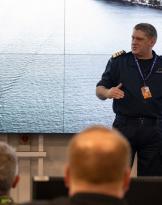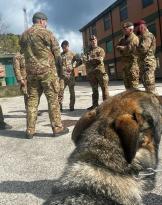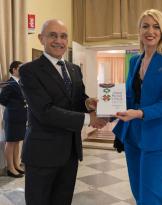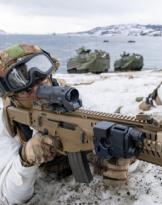Last 03 March it took place on board Nave San Giusto, moored in Taranto, the handover to the tactical command of theOperation Safe Mediterranean (OMS) between rear admiral Stefano Frumento and the incoming rear admiral Stefano Costantino in the presence of the commander in chief of the naval squadron, squadron admiral Aurelio De Carolis.
"Presence, promptness and flexibility are the fundamental characteristics that make this operation an instrument capable of reconfiguring itself in a very short time to meet the most disparate needs while continuing to perform all the main tasks of the defense and surveillance functions".
These are the words of Admiral Frumento, commander of the first naval division who, in his greeting address, described the activity carried out as "an incessant, all-weather and effective work, possible only thanks to the commitment and motivation of the real protagonists, the captains and the extraordinary crews that have been assigned to me".
In his speech, Admiral Costantino, commander of the third naval division, intended to underline how the "intrinsic operational flexibility of the means and the training of the Navy crews and staff allows to better decline the maneuver scheme of the naval team" ensuring right within the ambit "of Operation Safe Mediterranean: conventional deterrence, presence, surveillance, vigilance and readiness for intervention, as well as support for dialogue and cooperation which has always been inherent in the instrument of naval diplomacy".
 Today's ceremony concluded WHO's 4th Rotation of Command, previously called Safe Sea and expanded last summer in tasks and area of responsibility: “With the change of denomination there has been no interruption - underlined Admiral De Carolis during his speech - the transition took place in full continuity between the two operations, both on a tactical level and in the profound evolution of the operational and strategic contents. Safe Mediterranean is more complex than the previous one, characterized by a greater number of tasks to be performed and by a geographically much wider area of operations which has made it possible to achieve greater synergies between the naval and air assets involved in OMS and those carrying out other operations , national or international, confirming the multidisciplinarity and the intrinsic multidimensionality of the maritime forces".
Today's ceremony concluded WHO's 4th Rotation of Command, previously called Safe Sea and expanded last summer in tasks and area of responsibility: “With the change of denomination there has been no interruption - underlined Admiral De Carolis during his speech - the transition took place in full continuity between the two operations, both on a tactical level and in the profound evolution of the operational and strategic contents. Safe Mediterranean is more complex than the previous one, characterized by a greater number of tasks to be performed and by a geographically much wider area of operations which has made it possible to achieve greater synergies between the naval and air assets involved in OMS and those carrying out other operations , national or international, confirming the multidisciplinarity and the intrinsic multidimensionality of the maritime forces".
In the last 60 days of activity, the OMS aeronaval device, made up of over 700 men and women aboard ships and submarines, has continued to ensure the surveillance and protection of vital maritime spaces for our country, in a portion of the Mediterranean it goes from the west of Sardinia to include all of its central and eastern part. Added to this is an auxiliary ship engaged in supporting the technical-logistical needs of the Libyan Navy, permanently located in the port of Tripoli.
Among the numerous tasks, the defense of maritime communication lines, the monitoring and protection of the national, merchant and fishing fleets, the increase in surveillance and the protection of the dense network of strategic underwater infrastructures that run on the seabed around the Peninsula, such as cable ducts telephone and data transfer lines, power lines and gas pipelines. International, inter-ministerial cooperation and synergy in the field of maritime security with the countries bordering the Mediterranean complete the picture of the activities carried out by this important Operation in defense of the free use of the sea.
“A coherent and harmonious action - added Admiral De Carolis - which saw the synergistic use of the assigned ships, submarines, helicopters and patrol aircraft, together with the boarding teams of the San Marco marine brigade". Of all the parallel activities it should be mentioned “the contribution to the deterrent effect that NATO is generating throughout its area of responsibility following the Ukrainian crisis - remarked the commander-in-chief of the naval squadron. The scenario that has emerged “allows - added the admiral - to better manage the overall effort to guarantee the maritime safety of the Mediterranean as a central operational theater in the wider area of national strategic interest called the Enlarged Mediterranean".
Finally, addressing the crews, he concluded as follows: “Be aware of the relevance of your work for the Navy and for the nation as a whole. A significant contribution to the maritime safety of trade routes, submarine and offshore infrastructure and the various economic activities carried out on the high seas".











